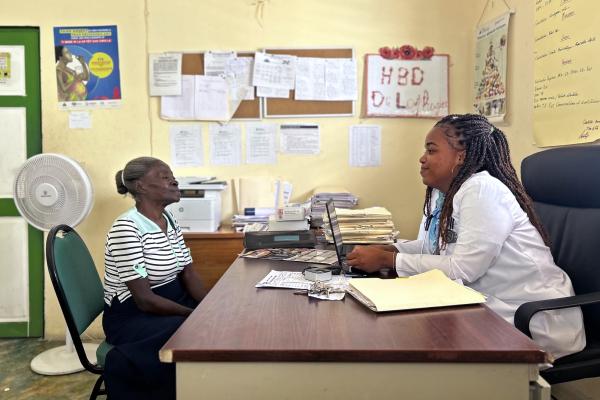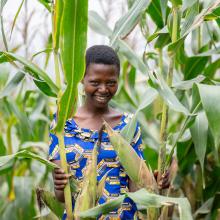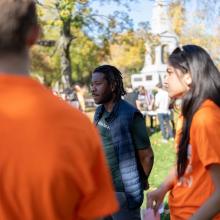Acefie Théodore began experiencing unusual symptoms.
The lifelong farmer had always been strong and hardworking. She grew crops, cared for animals, and raised her three children in Haiti’s rural town of Mathégouasse, located close to the border of the Dominican Republic.
“I would wake up before sunrise to prepare breakfast and go to the garden with my husband,” Théodore said. “We worked together. I was healthy, active, and independent. I was supporting my family.”
But in 2008, Théodore suddenly became extremely fatigued. Her appetite and weight declined dramatically and she had persistent, debilitating fevers.
Théodore was in critical condition when she arrived at the Partners In Health (PIH)-supported Notre Dame de la Nativité Hospital in Belladère. There, she discovered she was positive for HIV.
Suddenly, Théodore was not only dealing with an extreme physical toll, but also a deep emotional one.
“When I was told I had HIV, I thought it was over,” she said. “I thought, ‘I will die soon.’ People in the neighborhood started to reject me, even some members of my own family turned their backs on me. They didn’t want to share meals with me anymore. They pointed fingers at me.”
It was profoundly painful for Théodore, who felt isolated, ashamed, and shrouded by stigmatization.
She began to regain hope, though, after she spoke to Oliver Antonio, a health care worker at Zanmi Lasante, as PIH is known in Haiti.
“One day, (Antonio) told me: ‘Illness doesn’t fall on trees, it falls on living human beings,’” Théodore said. “That sentence woke me up. I told myself that if God had kept me alive until now, it’s because He has a plan for me.”
Despite the long distance between Théodore’s home and the hospital—an approximately two-hour-long walk—she hardly missed a medical appointment in over 15 years, and always diligently took her medication.
“I always went to the hospital, even when I didn’t have money for transportation,” she said. “Sometimes I walked several kilometers. But I never stopped my treatment. I know that if I don’t take my medicine, my life will end sooner.”
Missed appointments and a race against time
As such, Dr. Stéphanie Laphague, head of the tuberculosis and HIV program at the Notre Dame de la Nativité Hospital in Belladère, grew concerned when Théodore didn’t come to the hospital as planned for two months.
In March of 2023, a community health worker found Théodore bedridden, and informed Laphague that her health had seriously deteriorated.
Laphague quickly mobilized a small team to travel to Théodore. The search party was composed of herself, a social worker, and a support worker.
Together, they made the trek to Mathégouasse. When they found Théodore, she was nearly unrecognizable.
Théodore was “extremely thin, lying down, and without energy,” Laphague said.
She had been unable to move or seek help and needed immediate medical attention, but the roads back were rough—and they did not have an ambulance.
Instead, the team hauled Théodore onto a motorcycle, knowing it could be a matter of life or death.
She made it to the hospital, where she was diagnosed by clinicians with pulmonary tuberculosis (TB). Despite a TB cure existing for decades, it is still the deadliest infectious disease in the world. For people like Théodore, who have a weakened immune system from HIV, the chances of contracting the illness are even higher—and outcomes worse.
Théodore needed to stay at the hospital for weeks. However, with intensive medical care, psychological support, and nutritional support, she was finally released and able to start outpatient treatment.
“If Zanmi Lasante wasn’t there, I wouldn’t be alive,” Théodore said. “Zanmi Lasante is not just a hospital, it’s hope. It’s family. It’s love. Thank you very much for everything you do for those who don’t have money, for the unfortunate, for those who suffer.”
PIH also supported Théodore with financial assistance and emotional support during her TB treatment regimen and ongoing HIV care.
“I’ve been living with HIV for 17 years,” Théodore said. “I had tuberculosis, I almost died. But thanks to God and Zanmi Lasante, I’m still here. I tell everyone: don’t be ashamed, don’t be afraid. These illnesses aren’t a death sentence, they’re a call to take care of yourself.”
Laphague has been amazed by Théodore’s perseverance.
“She’s a strong, resilient woman,” Laphague said. “The work we do in the TB/HIV program isn’t just about prescribing medication. It’s a profound human commitment, a daily fight for human dignity.”
That commitment is more important than ever before, especially with global health funds shrinking and disruptions to U.S. foreign aid disbursement. Access to HIV medication should not be more difficult over the next year, but beyond that horizon, the supply may fluctuate as the situation evolves and alternative sources of supply chain funding rise or fall, explained ZL Infectious Disease Division Director Alain Casseus.
“For me, every patient saved is a victory over stigma, over oblivion, over injustice,” said Laphague.



